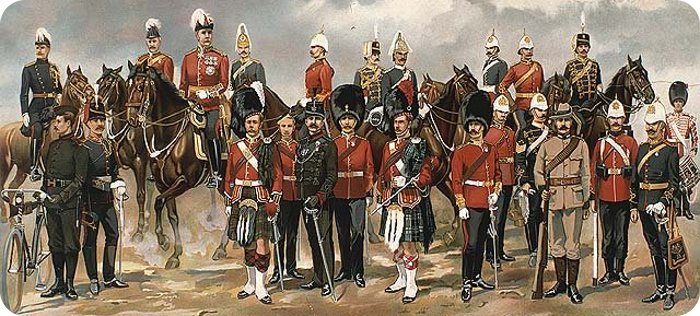Topic: Discipline

The Snow Shovelling Mutiny (1896)
Boston Evening Transcript, 20 March 1896
Young Jingoes Cooled Off
Wanted to Fight Yankees But Shovelled Snow Instead
Montreal, March 20—During the period of strained relations between Great Britain and the United States over the Venezuelan affair, fifty of Quebec's rustic jingoes, connected with the cpountry battalions of militia, betook themselves to the Royal Canadian Infantry School, at St Johns, Que. Their idea was to take a three months' course of instruction in that institution, to prepare for the contingency of war. These young fellows, in the main, belong to good families in their respective localities; are accustomed to donning their "soldiers clothes" and lording it over the "other fellows" in the ranks of the rural corps. But at the school they became "the other fellows" and the "lording it fell to the lot of Colonel d'Orsonnens, the commandant, and his staff. Unaccustomed to this sort of thing, the "attached men," as they are called, mutinied, their leaders are under military arrest, and a court-martial was convened to try them for the gravest of all charges of which a soldier can be guilty. The court-martial is composed of Lieutenant Colonel Wilson, Deputy Surgeon General Campbell and Major Young, all of the Royal Regiment of Canadian Infantry.
The charge of mutiny is based on the refusal of the "attached men" to turn out of barracks to shovel snow, after their instructional guard mounting parade had been cancelled, in order that they might clear the barracks yard after a severe storm. The regulars of the school were at the time detailed on other fatigue duty. When the bugle sounded for the snow shovelling brigade, not a man of the fifty "attached" would stir from his quarters. They had, the claimed, entered the school to learn the science of war, not to perform menial duty. However, as they, by regulation, are amenable to the same rules as the regulars, Colonel d'Orsonnens was in a position to compel them to carry out his orders.
"Sound the emergency call," was the order.
There was no denying this, and the whole force, "attached" and regular, lined up at the emergency rendezvous in quick time.
Six of the leaders of the men thirsting for military knowledge were put under arrest, and the other forty-four went at the snowbanks with a zest surprising indeed, when compared with the reluctance previously displayed. Just what punishment will be meted out to the mutineers is not known. They are liable to a term of imprisonment, under military discipline, or, as an alternative, may be dismissed from the service in disgrace. Probably the latter course will be adopted.
The attached men are much disgusted over the affair, and are not nearly so bellicose today as they were at the time when they left the ease of rural homes to tread the path they fondly hoped would lead to glory, and the demolition of the enemy—not snowbanks.
Ottawa Citizen, 21 March, 1896
St. John's Mutiny
A Regimental Court Martial Finds the Men Guilty
St John's Que., March 21—The court-martial on the non-commissioned officers and men in charge of squads of the attached men at the Royal School of Infantry, who were placed under arrest for mutinous conduct a fortnight ago, was completed last evening, when the prisoners were found guilty of the charge preferred against them, namely, mutiny. The court, which consisted of Lieut.-Col. Wilson, R.C.A., president; Surgeon-Major Campbell and Major Young, R.R.C.I., forwarded their findings to Ottawa. The maximum penalty provided for mutiny under military law is two years' imprisonment, but it is thought here that Major-General Gascoigne will not favor a severe sentence, considering the fact that these men were merely inexperienced volunteers, not thoroughly acquainted with military discipline.
The men convicted are:
- Corporal W.G. Daniels, of the 43rd, Ottawa and Carleton Rifles;
- Corporal Duquette and
- Corporal L.E.J. Dubeau, of the 17th Battalion, Levis;
- Corporal W. Clark of the Fifth Royal Scots, Montreal;
- Private J. Touchette, 65th, Mount Royal Rifles;
- Private A.H. Simmonds, 54th Battalion, Richmond.
The Quebec Saturday Budget, 4 April, 1896
In an editorial on the St Johns' court martial, the Ottawa Journal says:
"Gen. Gascoigne is to be congratulated on his lenient treatment of the insubordinate members of the St Johns' Military School. The six volunteers, who were all corporals, escape with a reduction to the ranks and a reprimand. The three months' imprisonment with hard labor, which had been part of the sentence, was wisely remitted by the General."

Later service by some of the mutineers:
Private Josephat Touchette, 65th Mount Royal Rifles, would later go to South Africa with the 2nd (Special Service) Battalion, The Royal Canadian Regiment. (Regt No. 7807, received QSA Medal with Clasps PAARDEBERG, DRIEFONTEIN, CAPE COLONEY, TRANSVAAL.)
There can also be found in the Library and Archives Database for Soldiers of the First World War, one Albert Henry Simmonds. Born in 1876, he is certainly old enough to be our mutineer. The prior service he claims on his CEF attestation is, sadly mis-typed and typed over, but may be showing 2 years with the 54th (or 53rd) Regiment as well as one year with the 3rd (Special Service) Battalion, The Royal Canadian Regiment.

